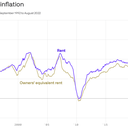The housing problem is also the inflation problem

Surging housing costs are the engine driving Tuesday's worrisome Consumer Price Index report — and it's going to be tough to bring them down.
Why it matters: The inflation numbers provoked a fresh round of worry that the Fed still hasn't gotten inflation under control, and that it'll have to raise interest rates quite a bit more.
Driving the news: Core U.S. inflation — that is, price increases stripping out volatile food and energy costs — jumped more than expected in August.
- That measure is up 6.3% compared to a year earlier (analysts had expected 6.1%).
The big picture: Shelter costs were the single most important category driving core inflation up, as they are weighted heavily in CPI calculations.
- Rent costs were up 6.7% annually.
- Owners' equivalent rent, a measure that tries to capture the monthly costs homeowners would pay to rent their home, was up 6.3%.
- Both rates are the highest since the mid-1980s.
What we're watching: Purchase prices for homes. The COVID-related housing boom pushed the median purchase price of an existing home up roughly 50%.
- That surge in home prices continues to filter through to rents, which in turn, is driving inflation.
- While the surge in mortgage rates this year has slowed buying activity, there've been few indications lately that house prices are falling much.
- So there's little reason to think inflation is going to suddenly abate much either.
What they're saying: "Typically, once those major shelter components begin to gather momentum, there’s an element of inertia that tends to keep them hot for some time," says Jason Pride, chief investment officer of private wealth at Philadelphia-based money management firm Glenmede.